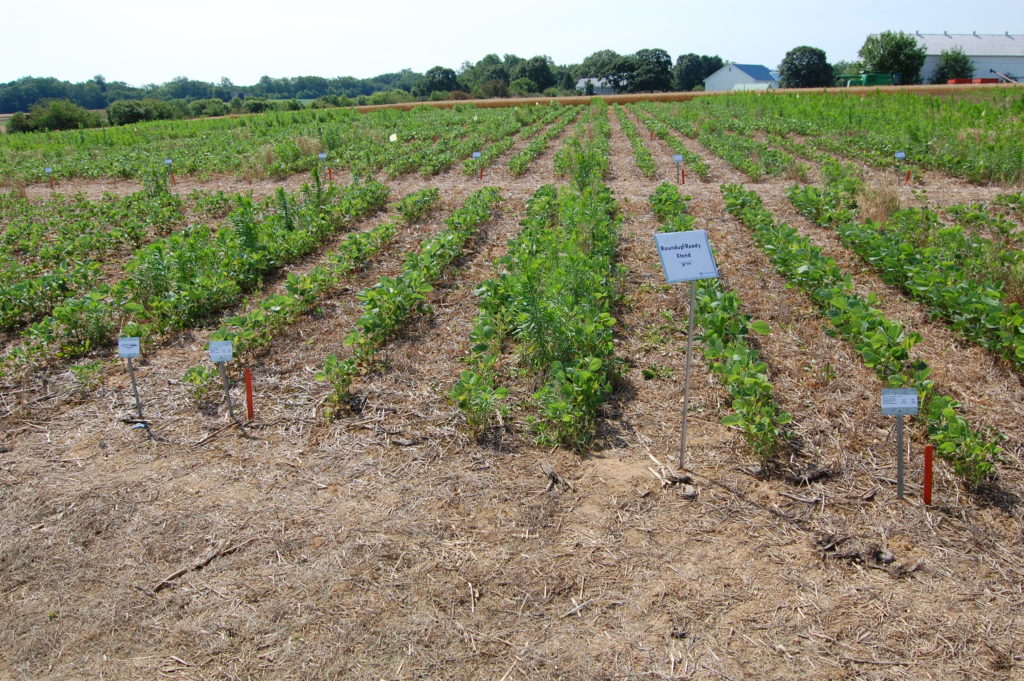Soybean Variety Performance Results Available from Penn State
Seed selection one of the most important management decisions farmers can make.
HARRISBURG, PA (December 27, 2017) – If you haven’t purchased your soybean seed yet, it may pay you to check out the results of the variety trials conducted by agronomists at Penn State.
“There are many things farmers can’t control, like the weather, growing conditions, and pressure from disease, insects and weeds. But seed selection is the one thing farmers do have control over,” says Penn State agronomist Dr. Greg Roth. “It’s probably one of the most important management decisions a farmer can make. The variety selection can make as much as a 15 bu./acre difference, which can dramatically impact a farmer’s bottom line.”
In research funded in part by the soybean checkoff, Penn State agronomists conducted the 2017 Soybean Performance Trials on both early and late glyphosate-resistant varieties and non-glyphosate resistant varieties in test plots at the University’s research centers in Landisville, Lancaster County, and Rock Springs, Centre County. A total of 142 varieties were tested. “We had very good trials at both locations this year with yields averaging around 70 bu./acre for most tests,” says Roth. Results are available at https://extension.psu.edu/2017-soybean-variety-trials and on the Research page at the Pennsylvania Soybean Board website at www.pasoybean.org.
The reports also allow producers to get an independent perspective of how different soybean traits are yielding. “In our report, we included a description of traits to distinguish between Roundup® Ready and Roundup Ready Xtend® varieties. At both sites, we also conducted a non-glyphosate trial of conventional, Liberty Link, and STS varieties. “We included several glyphosate-resistant checks in each of these tests to compare relative performance. On average, in this test, the Liberty Link lines yielded as well or better than the glyphosate resistant lines,” says Roth.
In addition, a double crop trial was conducted at the Landisville site that included glyphosate-resistant varieties.
Increasingly, quality, not just yield, is becoming important to purchasers of soybean. The true value to end users comes from what’s inside the soybean; principally, its protein (representing approximately 65 percent of the value of the soybean) and oil (representing the other 35 percent.)
“Grain samples for most varieties tested in 2017 were sent to Iowa State for protein and oil analysis,” says Roth. “Our soybeans tend to have higher protein than those produced in the upper Midwest. This year, entries averaged 35.7 percent protein in the Lancaster trial and 35.9 percent protein in the Centre County tests.”
Selecting seed is more than just picking the variety with the highest yields, cautions Roth. When selecting a variety, it’s also important to select varieties based on maturity, drought and pest avoidance potential, and tolerance to herbicides and resistance to nematodes and diseases. “Many producers tell us that early soybeans do well when planted early and we see that in our variety tests as well,” says Roth.
See Penn State’s Field Crop News or the Research page on the Pennsylvania Soybean Board website for complete trial results.
About the Pennsylvania Soybean Board
The Pennsylvania Soybean Board is a farmer-controlled Board responsible for managing Pennsylvania’s share of funds received from the nationwide Soybean Checkoff program. The funding is available under an assessment program, approved by Congress in 1990, under which soybean farmers contribute 50 cents of every $100 they receive for their beans at the first point of sale. Funds are used to develop markets, educate consumers, and research new ways to utilize and produce soybeans more efficiently. For more information, visit www.pasoybean.org.
